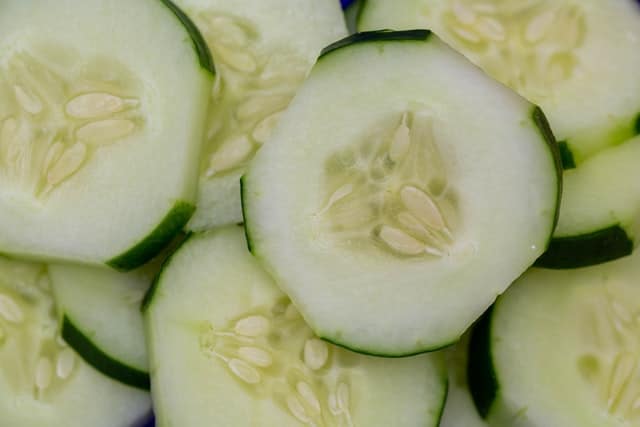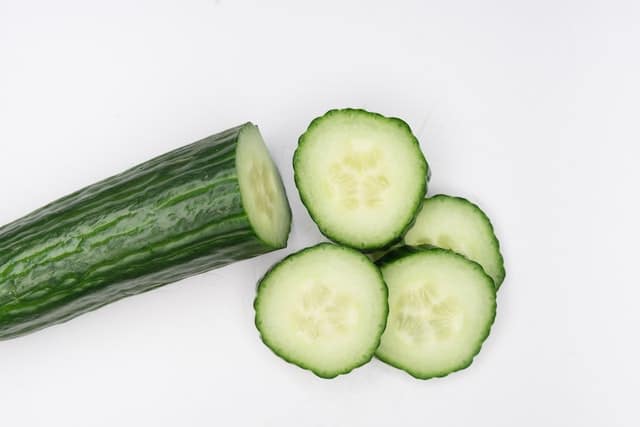Is cucumber good for constipation?
Constipation occurs when you don’t pass stool as frequently as you should. Your stool may become firm and dry, making it difficult to pass.
Constipation can be caused by some issues, but the most common causes are a low-fiber diet, dehydration, and lack of exercise
How to Relieve Constipation
Regular physical activity is essential. Increase your water intake and fiber intake. At least 3 to 4 times each week, go for a walk, swim, or do something active.
To alleviate constipation, try the following:
- Meals should not be skipped.
- White bread, pastries, doughnuts, sausage, fast-food burgers, potato chips, and French fries are all processed or quick meals to avoid.
Constipation can be relieved by eating high-fiber meals such as green leafy vegetables, fruits, salad, and barley.
Fortunately, many meals can help treat constipation by adding volume, softening stool, shortening the time it takes for food to pass through the digestive tract, and increasing stool frequency.
Cucumber is nearly always present in the ingredients of a perfect salad! This is because it offers several health advantages.
- Cucumber is a mineral, vitamin, and electrolyte powerhouse that is best taken fresh. Cucumbers are an essential ingredient in a variety of summer dishes, including sandwiches, salads, smoothies, and raita.
- Cucumbers and summers are inextricably linked. Cucumbers are refreshing and they’re packed with nutrients, making them one of the healthiest foods you can eat. In addition, Cucumber is high in water and low in calories.
- Cucumber has a high nutritional value and is rich in vitamins and minerals. Half a cup of cucumber slices has just 8 calories but 1.9 grams of carbs, 0.3 grams of fiber, and 0.3 grams of protein. Magnesium, potassium, vitamin C, vitamin K, copper, magnesium, potassium, and manganese are among the other nutrients found in it. Moreover, Cucumber is rich in silica, which is great for skin and hair health
- Even one cucumber a day might be beneficial! It is mainly made up of water, which makes up roughly 95% of the cucumber’s weight. So, even if you consume more than one, you will not be harmed. It will keep you full and prevent you from reaching for bad food.
How do Cucumbers prevent constipation? The Power of Pectin

Is cucumber good for constipation – pectin?
- Cucumber softens the stool and facilitates its passage through the intestinal walls.
- Cucumber is rich in fiber content, which prevents constipation and ensures regular bowel movement. Cucumber contains pectin, a water-soluble fiber. Pectin joins together water molecules, making your feces larger, softer, and easier to pass.
- Furthermore, Pectin improves the mobility of the intestinal muscles and alleviates their clinical symptoms.
- According to research published in Fitoterapia by Jadavpur University, cucumber seeds, of which there are numerous, assist to “avoiding constipation. To help treat constipation, add cucumbers to a variety of meals.
- Every day, the average adult drinks around 3 quarts (12 cups) of water. Typically, food accounts for around a fifth of that. Cucumbers are a great source. Each one contains around 95% water. Cucumber and water together provide a hydration boost that improves stool consistency and reduces constipation risk.
- However, if you drink additional water on top of cucumber, you’ll have more loose movements and diarrhea since your bowel movement will be very smooth. So go ahead and gorge yourself on the nutrient-dense vegetable; just make sure to leave at least 20 minutes between eating cucumbers and downing a glass of water.
Note!
- For improved nutritional absorption, avoid drinking water either before or right after eating fresh vegetables and fruits. Drinking water just after eating cucumber may enhance GI motility and disrupt the natural digestion and absorption process. The body stores extra water in the gut as a result of the interaction between fiber and water, which might disrupt the normal process.
- Drinking water with or after cucumber is also thought to disrupt the body’s optimal pH balance for digestion. Too much water can dilute the pH levels, making the acids needed to digest food less efficient, resulting in poor digestion.
Interesting ways to incorporate cucumber into your diet
Cucumbers are easy to include in your diet. They have a chewy texture and a crisp texture. Cucumber is a wonderful summer vegetable to eat. The easiest ways to add cucumber to your daily food include:
- Cucumber Juice
- Pickled cucumber
- Baked cucumber chips
- Cucumber salad
- Cucumber sandwich
- Cucumber cooler
Other health benefits of Cucumber
- Eating cucumbers can help you lose weight
- It helps in maintaining the blood sugar level
- Your immunity will be strengthened
- Consuming cucumbers can help with your vision
- cucumber for glowing skin
- It Contains Antioxidants
- It Promotes Hydration
- Support heart health
- Reduce bad breath
Conclusion
Cucumbers are high in water content, and their skin is high in insoluble fiber. Water and fiber both help food flow more quickly and smoothly through the digestive tract, which aids in the prevention of constipation.
In addition, staying hydrated is crucial for several reasons, including maintaining a healthy gut, avoiding constipation, and avoiding kidney stones.
See Also
Is Pineapple Good for Constipation
References
https://www.healthline.com/nutrition/
https://www.huffpost.com/entry/
